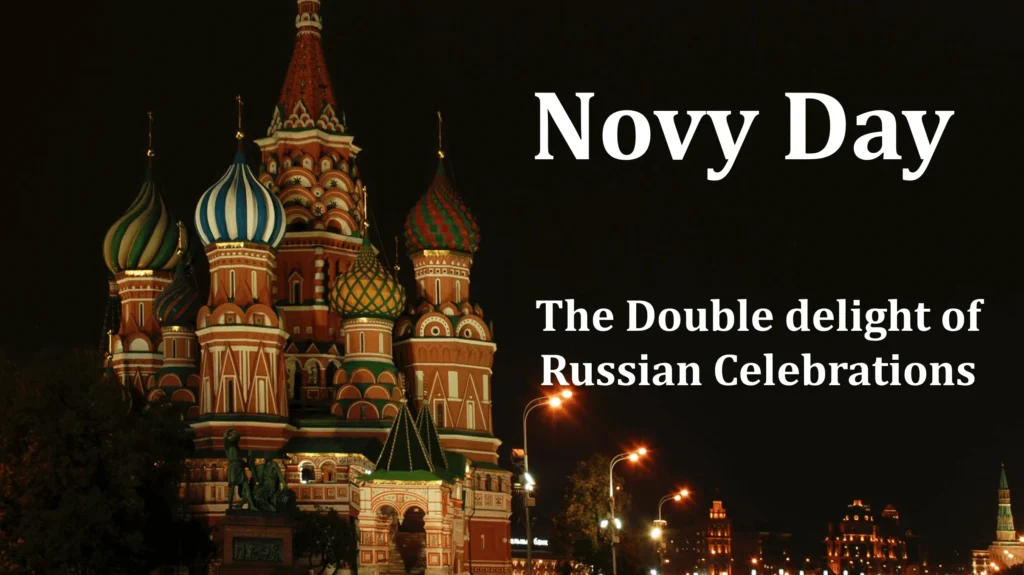
The joy of celebrating a new year is a universal sentiment that people together across cultures. In Russia, however, this joy is amplified through a unique tradition called Novy Day. On both January 1 and January 14, Russians have the opportunity to partake in double festivities, making their New Year celebration truly special and distinct. So, let’s dive deeper into the fascinating world of Novy Day and uncover the historical journey that led to this extraordinary dual celebration.
Historical Journey of Novy Day
Ancient Russian Celebrations on March 1
To really understand the importance of Novy Day, we need to go back to ancient Russia. Celebrations were conducted on March 1, which represented the beginning of the year at the time. People celebrated the end of the tough winter and the prospect of brighter days ahead during these events.
Introduction of Christianity by the Byzantine Empire in 988 A.D.
The year 988 A.D. saw a dramatic alteration in Russia’s calendar and cultural norms. The celebration of the New Year changed once the Byzantine Empire introduced Christianity. The Christian influence instilled religious meaning in the celebrations, adding a spiritual depth to the happy occasion.
Shifting to the Byzantine Calendar and Celebrating on September 1
When Russia embraced the calendar, they decided to move their New Years celebration to September 1. This change was in line with the Orthodox tradition of observing the Ecclesiastical New Year. September became a month of happiness for Russians as they joyfully marked the arrival of autumn and a new cycle of time.
Peter the Greats Announcement in 1699 to Embrace “The European Way”
In 1699 Tsar Peter the Great made an adjustment to the New Years celebration. Inspired by his travels and witnessing how Western Europe celebrated New Years Peter aimed to align Russia with “the way.” Consequently, January 1 became widely accepted as Russia’s New Years Day like their European counterparts.
Adoption of the Gregorian Calendar in 1918
In 1918 Russia adopted the calendar to synchronize with countries across the globe. However, this adoption created a discrepancy of 13 days, between the Gregorian calendars. Despite this difference the Orthodox Church continued following the calendar. Moved their New Year celebration to January 14. This unique situation gave rise to the celebration that Russians now enjoy.
The Dual Celebration Dilemma
Explanation of the choice between January 1 and January 14
Many Russians find themselves divided between celebrating on January 1st or January 14th. The disparity is caused by the Gregorian and Julian calendars. This mismatch stems from the use of the Gregorian calendar in the twentieth century. While other nations embraced the Gregorian calendar, Russia remained to use the Julian calendar for religious festivities.
Impact on Russian traditions and celebrations
The impact of this choice on Russian traditions and celebrations is significant. According to the calendar Russia celebrates the New Year on January 1st. This celebration has a nature and includes fireworks, parties and a countdown until midnight. Meanwhile, on January 14th, according to the Julian calendar, Russians rejoice in the Orthodox Christmas.
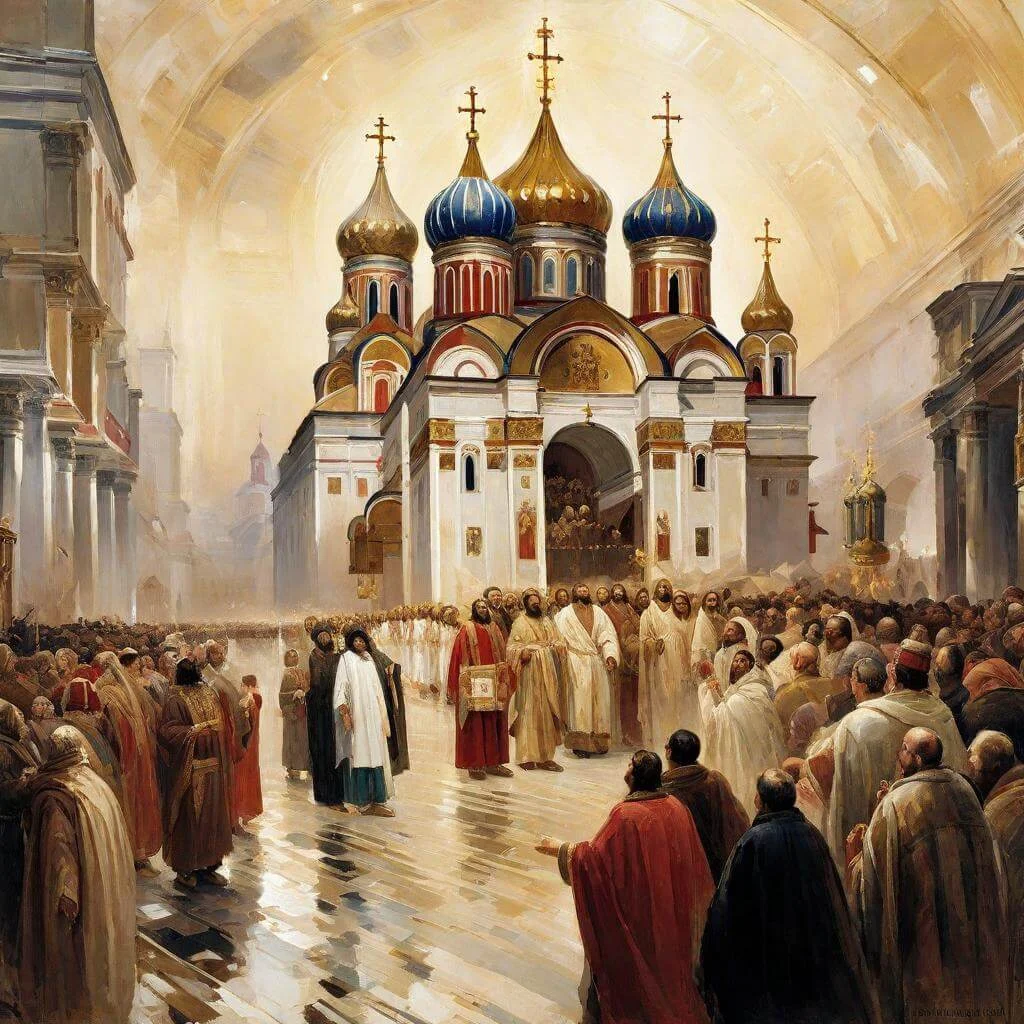
Emergence of Novy Day with the option to celebrate twice
The dual celebration dilemma has given rise to a delightful compromise – Novy Day. For those who want to embrace both celebrations, Novy Day offers the perfect solution. It allows Russians to enjoy the festive spirit twice, doubling the joy and enchantment that these celebrations bring. Novy Day has gained popularity in recent years, as it offers the opportunity for both religious and secular festivities.
Preparations for Novy Day
Cleaning and decoration of homes
Traditional symbolic cleaning rituals
A crucial aspect of Novy Day preparations involves thorough cleaning of homes. This tradition of cleaning signifies the act of saying goodbye to the year and embracing the one with a renewed spirit. Removing dust and cobwebs getting rid of negativity and eliminating impurities are actions that help Russians embrace the cleansing process during this transition.
Adding decorations
After finishing the cleaning it’s time to embellish the house with decor. The decorations play a role, in creating an atmosphere. From garlands and twinkling lights to designed ornaments each decoration contributes to the joyful ambiance. Russians often showcase their creativity in choosing and arranging these decorations making each home unique and captivating.
Symbolic meaning of ornaments
Certain ornaments hold significance during Novy Day celebrations. For example, in tradition hanging a sprig of mistletoe above the entrance symbolizes love, friendship and goodwill. Furthermore, placing a decorated Christmas tree in the living room does not add beauty but also symbolizes life, hope and prosperity.
Preparing for the feast and culinary delights
Russian New Years cuisine
The culinary aspect of Novy Day brings pleasure. Russian households prepare a feast to mark this occasion. Dishes such, as Olivier salad become the star of the show featuring a blend of boiled potatoes, pickles, eggs and mayonnaise. Other beloved culinary delights include caviar, borscht (a beet soup) and pelmeni (dumplings). The delectable flavors and hearty portions guarantee a dining experience.
Popular dishes and their symbolic meanings
Each dish served during Novy Day carries symbolic meaning. For example, Olivier salad represents abundance and prosperity, while caviar symbolizes wealth. Borscht, a deep red soup made with beets, signifies good luck and vitality. The pelmeni, resembling a small pouch, symbolizes togetherness and unity among family and friends.
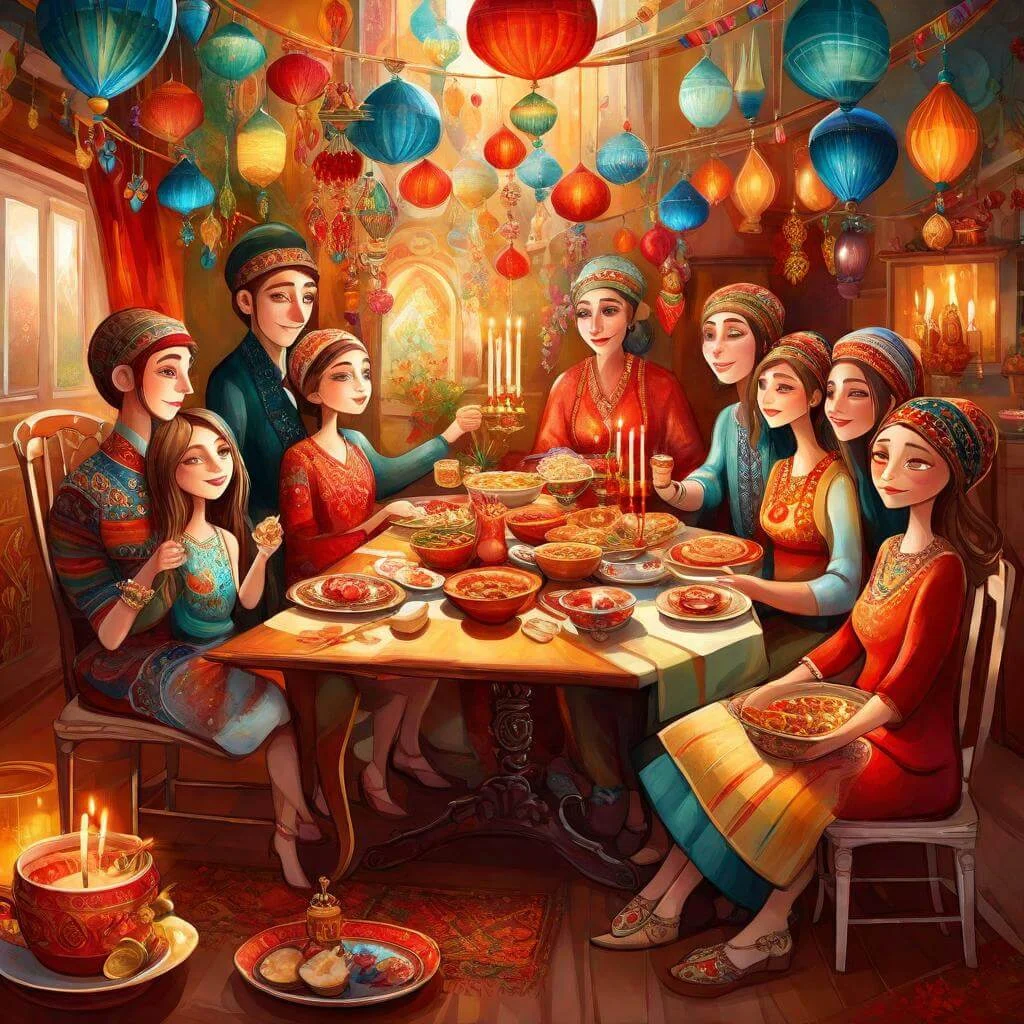
Traditional New Year’s drinks and toasts
No event is complete without toasts and traditional beverages. In Russia people in spirits raise their glasses filled with champagne, vodka or kvass—a fermented beverage—to toast to Novy Day. These toasts are a way to express wishes for the year conveying hopes, for happiness, success and good health.
Purchasing and exchanging gifts
The Significance of Gift Giving on Novy Day
Giving gifts holds importance during the celebration of Novy Day. During this time giving gifts to family friends and colleagues are seen as an expression of love, appreciation and gratitude. In cultures it is believed that exchanging presents during this season brings about luck, warmth and prosperity, for both the person giving the gift and the one receiving it.
Traditional Gift Selections and Customs
Traditionally gifts exchanged on Novy Day consist of yet meaningful items like handwritten letters, handmade crafts or personalized ornaments. Russians aim to express their affection through gestures than extravagant presents. These gifts highlight the value placed on connections and genuine emotions.
Modern Trends in New Years Gifts
While the essence of gift giving remains unchanged contemporary trends have introduced options for Novy Day presents. Technological gadgets, trendy accessories or personalized experiences have gained popularity among gift choices. Nevertheless, Russians still believe that the sentiment, behind a gift is paramount – it reflects the depth of the relationship based on thoughtfulness and effort.
Novy Day Celebrations: The Grand Night
The New Years Eve festivities, in Russia, known as Novy Day are an event filled with excitement and happiness. As the clock inches closer to midnight families and friends come together taking part in age countdown customs that have been passed down through generations.
Awaiting the stroke of midnight
The anticipation grows as loved ones unite to welcome the New Year. Russians place value on spending this occasion with their family and close friends creating a sense of togetherness and warmth. Laughter fills the air conversations flow and there is an anticipation for what lies
Gathering with loved ones
Novy Day is a time for loved ones to reconnect and strengthen their relationships. Families gather together sharing stories exchanging gifts and enjoying each other’s company. It is a moment to reflect on the year while celebrating beginnings.
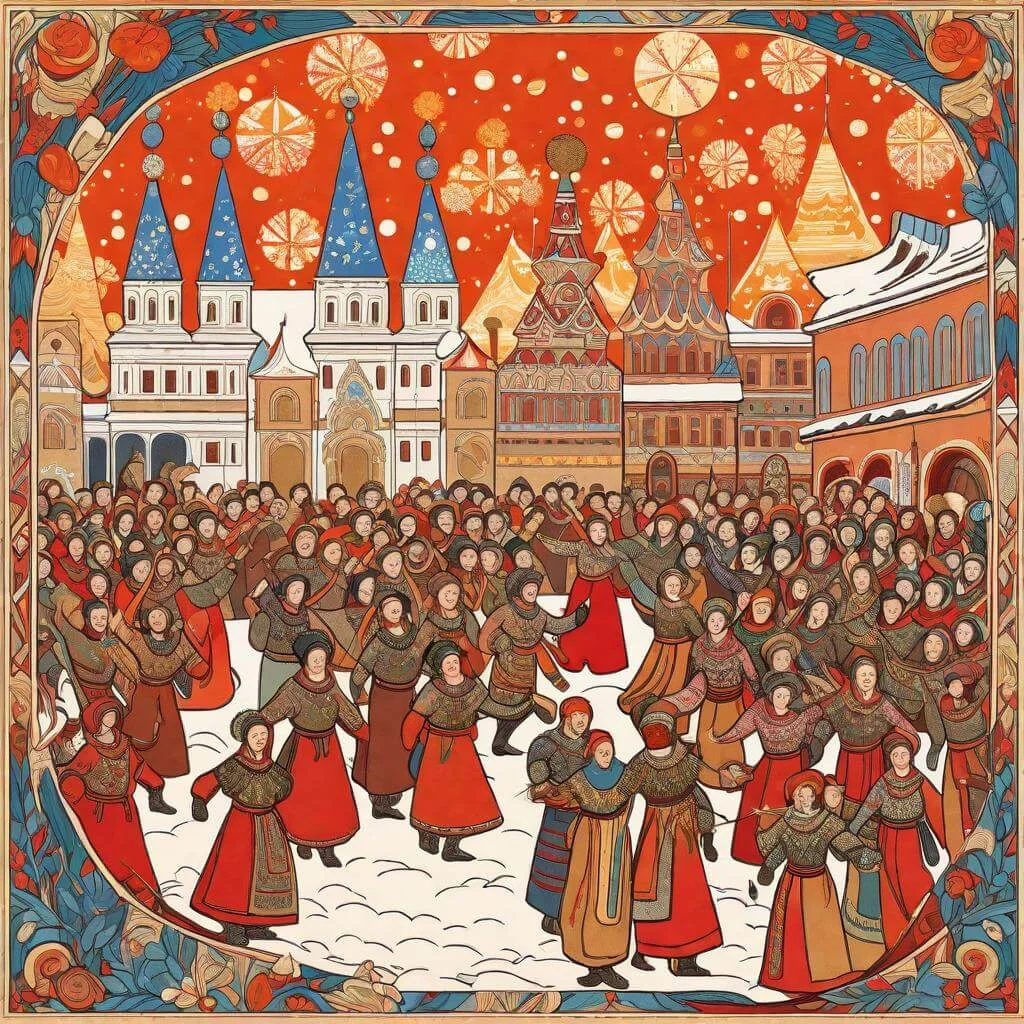
Taking part in countdown customs
Counting down to midnight is not an affair, in Russia: it involves engaging in various traditional customs that add an element of excitement and mystery to the celebrations. These traditions add a touch to the countdown making it a memorable experience. Whether its flipping, through a calendar discovering hidden fortunes or cracking open a walnut to reveal what the year holds these customs make the countdown truly unforgettable.
Presidential Traditions
An integral part of Novy Day celebrations in Russia is the New Year address by the president. This speech holds great significance as it sets the tone for the year ahead and reflects the aspirations and hopes of the nation.
Overview of the President of Russia’s New Year Address
Every year people across Russia eagerly await the presidents broadcasted New Year address. In this speech the president reflects on the accomplishments of the year acknowledges the obstacles faced and shares messages of hope for the future. It serves as a moment bringing the nation together as they look forward to what lies.
Evolution of the President’s Speech
Over time the president’s speech during Novy Day has evolved beyond matters. It now incorporates themes of joy, unity and celebration. Today this address deeply resonates with people’s emotions by reminding them of their shared values and aspirations.
The Midnight Chimes from Kremlin Clock
The highlight of the president’s address is when midnight strikes on the Spasskaya Tower clock, in Kremlin. As its chimes resonate throughout the country to announce the arrival of a year a collective sense of joy and anticipation fills every corner. This powerful symbol represents unity. Signifies opportunities and fresh beginnings.
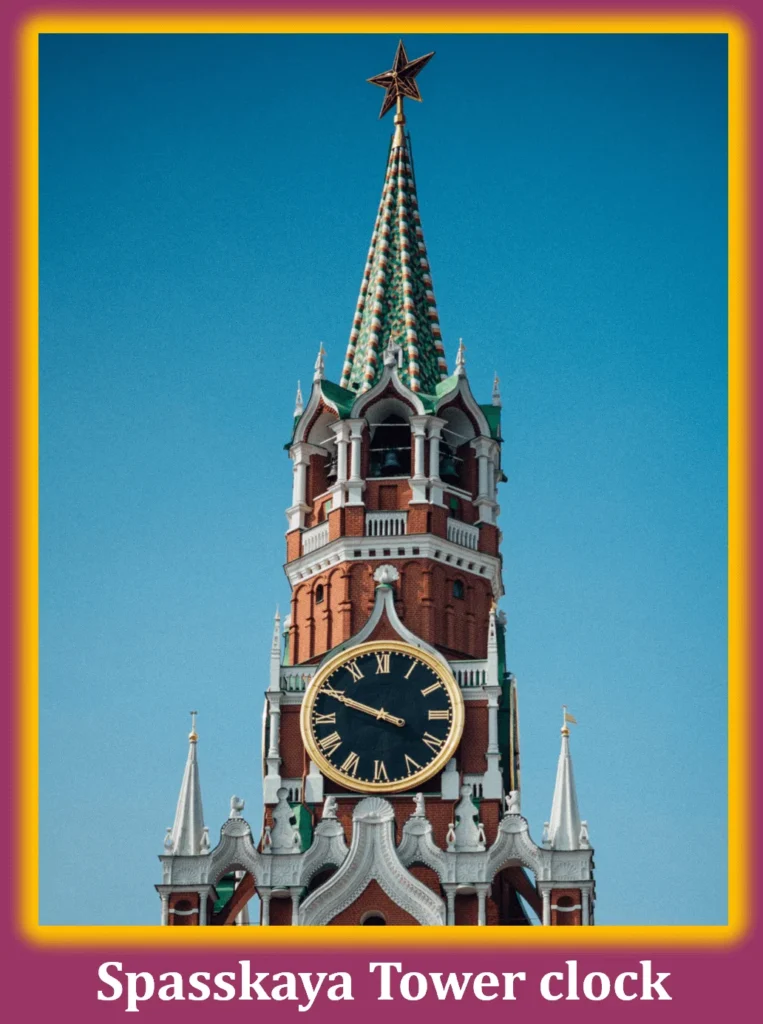
Fireworks and outdoor celebrations
Novy Day is incomplete without the dazzling display of fireworks that light up the night sky. Both public and private celebrations contribute to the spectacle of this grand event.
Public firework shows
In cities throughout Russia grand public firework displays are organized, attracting a multitude of spectators. These mesmerizing exhibitions captivate the audience filling them with a sense of awe and amazement. As bursts of colors illuminate the sky the crowd erupts in applause and cheer joyously celebrating the arrival of the New Year together.
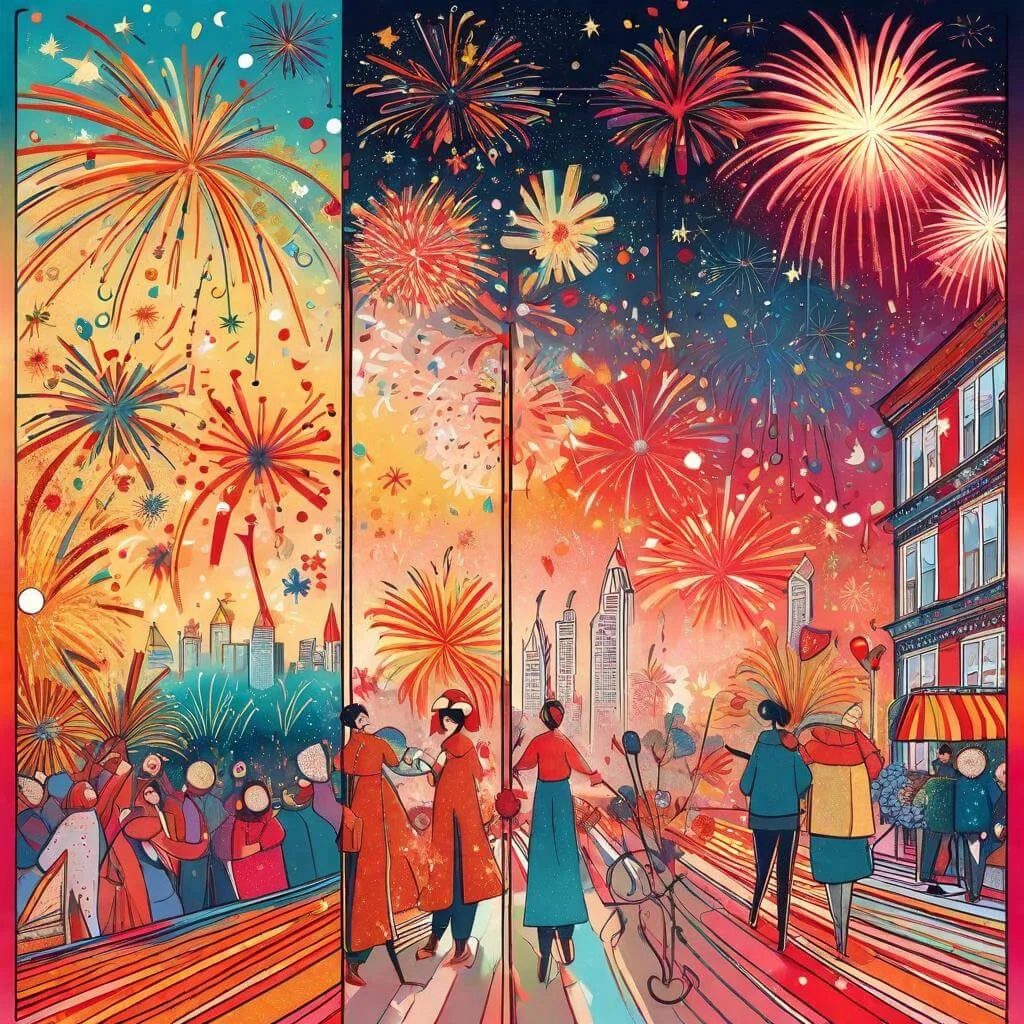
Private fireworks and pyrotechnic traditions
In addition, to the spectacles private individuals also contribute to the ambiance with their own fireworks. Russians have a fondness for pyrotechnics. It is common to witness individuals and families illuminating the night sky with their displays. The crackling. Shimmering lights bring an element of thrill to the festivities creating an atmosphere filled with happiness and delight.
Symbolism behind fireworks on Novy Day
Fireworks hold a meaning on Novy Day. The dazzling bursts of light are believed to ward off energies and usher in fortune for the upcoming year. It serves as a way to bid farewell to the year while embracing positivity and enthusiasm that lies ahead.
Traditional indoor festivities
Beyond the outdoor celebrations, traditional indoor festivities add to the charm of Novy Day. These cherished customs create an intimate and cozy atmosphere within homes.
Sitting down for the New Year’s dinner
The New Years dinner, referred to as “Novogodniy Stol”, in Russian is a feast that holds meaning and cherished customs. Loved ones gather around a set table adorned with a variety of dishes such, as Olivier salad, borscht, blinis and many others. This meal represents abundance, prosperity and the significance of uniting to celebrate moments of happiness together.
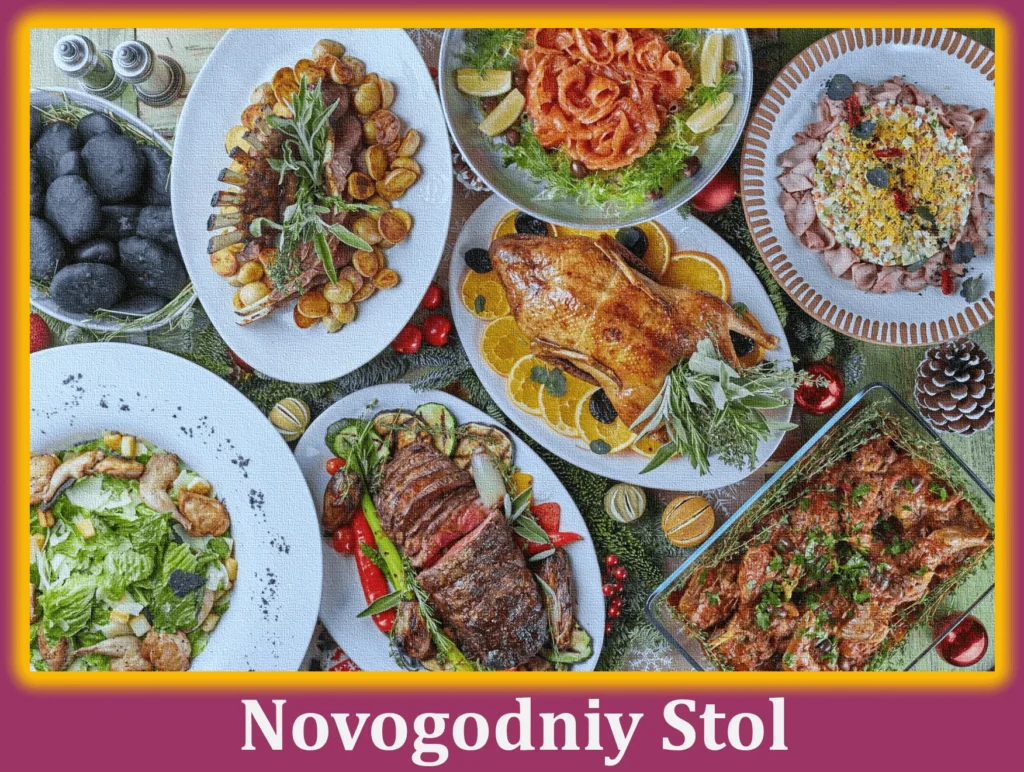
Watching the classic Soviet comedy film “Irony of Fate”
A beloved tradition on Novy Day is watching the timeless Soviet comedy film, “Irony of Fate.” This heartwarming movie follows the story of a man who ends up in a different city due to a mix-up in addresses, leading to unexpected adventures. It has become a symbol of the holiday season, bringing laughter and nostalgic feelings to households across Russia.
Dancing, singing, and other forms of entertainment
As the evening goes on families participate in types of entertainment, such, as dancing, singing and playing games. The joyful atmosphere surrounds everyone as they gather to celebrate relishing each other’s company and making memories that will endure for a lifetime.
Superstitions and Customs for Good Luck
In Russia welcoming the New Year with fortune is deeply rooted in customs that have been passed down through generations. The Russian people engage in rituals and fortune telling practices to invite luck into their lives on this occasion.
How Russians ensure good fortune for the New Year
Customs to attract good luck
Russians strongly believe in the power of customs to bring luck during the New Year. It is customary for people to thoroughly clean their homes removing any energy and adorn them with colors to attract prosperity and fortune for the upcoming year.
Symbolic rituals and traditions
One of the known traditions, on New Years Eve involves writing a wish on a piece of paper and setting it on fire. As the ashes scatter in the air it is believed that the wish will come true. This symbolic act not highlights the power of intention. Also represents a fresh beginning.
Predictions and fortune-telling practices
In Russia New Years Eve is a time where fortune telling becomes the attraction. People engage in divination ceremonies in order to catch a glimpse of what destiny holds for them. Whether it’s deciphering the shapes created by melted wax or unraveling the significance of floating candles Russians eagerly seek insights, into what the coming year may have in store, for them.
Unique Russian New Year traditions
Dressing up as Ded Moroz and Snegurochka
In Russia, it’s a fun tradition for folks to put on costumes as Ded Moroz (Father Frost) and Snegurochka (Snow Maiden) when they celebrate the New Year. These beloved characters, similar to Santa Claus and his helper bring happiness and presents to children. The magical presence of Ded Moroz and Snegurochka adds a touch to the celebrations.
Breaking dishes for prosperity
A distinctive tradition in Russian New Year celebrations involves breaking dishes for fortune. Friends and family gather together playfully smashing crockery against each others doors. This symbolic act signifies leaving any troubles from the year and welcoming prosperity and luck into homes for the upcoming year.
Carrying out charitable acts on Novy Day
On January 14th following the Russian Orthodox New Year Russians observe Novy Day or “New Day.” It is a time when acts of kindness flourish throughout society. Donating to charities volunteering efforts and helping those, in need. This day beautifully showcases Russia’s spirit of compassion and communal support.
New Year resolutions and hopes for the future
The significance of New Year resolutions
like people all around the world Russians also embrace the tradition of making resolutions for the New Year. These resolutions commonly revolve around growth, breaking habits and strengthening relationships with family and community. They symbolize the aspiration for change. Act as a guide for self-improvement throughout the year.
Modern trends in setting goals for the New Year
In times there has been a rise in Russia’s inclination towards setting measurable goals for the New Year. This shift reflects a growing desire among individuals to embrace self-discipline and enhance productivity. Then resolutions Russians are now more focused, on achieving tangible milestones and keeping track of their progress.
Novy Day as a time for reflection and personal growth
Novy Day, falling one week after the New Year, provides Russians with the opportunity for reflection upon their resolutions and personal growth. It acts as a milestone, for assessing their advancement and implementing any required changes. This moment of self-reflection on Novy Day emphasizes the significance of growth and motivates individuals to stay dedicated, to their objectives.
Novy Day in Modern Times
Reflection on the significance of Novy Day in contemporary Russia
Novy Day continues to hold immense significance in modern Russia. It represents a moment to contemplate achievements, learn from experiences, and set new intentions for the future. As the world rapidly evolves, Novy Day serves as a reminder to stay grounded in timeless traditions while embracing the dynamism of the present.
How the dual celebration reflects the country’s complex past
The dual celebration of the New Year’s Eve and Novy Day reflects Russia’s complex history. While the New Year’s Eve festivities were introduced during Soviet times, Novy Day draws its origins from the Russian Orthodox Church. This amalgamation of cultural and religious celebrations showcases Russia’s ability to interweave its diverse heritage into a harmonious whole.
Resilience of traditions in the face of evolving times
Despite the ever-changing landscape, traditional Russian New Year customs and Novy Day celebrations have withstood the test of time. These timeless customs showcase the unwavering spirit of the populace and their dedication to safeguarding their cultural legacy. The adoption of these rituals nurtures a feeling of solidarity and perpetuity that spans across generations.
Personal Stories and Preferences
Insights into how individuals choose between January 1 and January 14
When it comes to celebrating Novy Day, Russians face a delightful dilemma: January 1 or January 14? To gain deeper insights into this choice, we reached out to individuals across various age groups and backgrounds. Surprisingly, personal preferences varied greatly.
Some individuals embrace the New Year hype and choose January 1 as their primary celebration day. They absolutely adore the lights of the city the street festivals and the thrilling fireworks that announce the beginning of a new year. To them January 1 is a symbol of an opportunity to say goodbye to the past and embrace a brand start with open hearts.
Conversely January 14 holds a meaning, for those who have ties, to the Russian Orthodox Church. This date is recognized as the “Old New Year” as per the Julian calendar. People who follow this tradition often choose to celebrate on January 14, valuing the alignment with their religious beliefs and preserving their ties to time-honored customs.
Anecdotes or interviews with people who celebrate Novy Day twice
Intrigued by those who embrace both January 1 and January 14, we sat down with a few individuals who celebrate Novy Day twice. Their experiences painted a vivid picture of the joy that comes with adding an extra layer to the festivities.
Anastasia, a graphic designer, spoke passionately about combining the dazzling fireworks display of January 1 with the serene and reflective atmosphere of January 14. She described it as a harmonious blend of excitement and tranquility, symbolizing the perfect balance she seeks in her life.
Dmitri, a journalism student, explained how celebrating Novy Day twice allows him to embrace two sides of his identity – the modern, fast-paced world represented by January 1, and the deep-rooted cultural traditions associated with January 14. For him, this dual celebration reflects the intricate tapestry of his Russian heritage.
Diversity of perspectives and reasons behind their choices
Diversity, in perspectives and the various reasons behind choosing either January 1 or January 14 are truly fascinating. Peoples decisions are influenced by a range of factors, including beliefs, traditions and where they live.
Some individuals feel a connection to their family heritage. Choose January 14 because it aligns with long standing customs passed down through generations. For them celebrating Novy Day on any date than the “Old New Year” simply doesn’t feel right.
Others base their decision on practicality. Those who reside in regions, with freezing temperatures prefer to celebrate indoors on January 1 enjoying gatherings while saving January 14 for activities when the weather is more pleasant.
Conclusion & FAQs
In conclusion as we wrap up our exploration of Novy Day we can’t. Marvel at its cultural journey. It originated from the calendar. Has seamlessly merged with modern celebrations showcasing Russias enduring spirit of festivity.
Over the years this celebration has evolved to adapt to changes while still keeping its charm intact. Although Novy Day, in Russia is different, from Christmas it has a ambiance that brings people together to celebrate traditions and create precious memories.
We invite you, dear readers, to embrace the unique charm of Novy Day. Immerse yourself in the enchanting blend of festivity and reflection that this celebration offers. Explore the diverse perspectives and delve into the colorful anecdotes shared by Russians who celebrate Novy Day twice.
Embrace the double delight of Novy Day and immerse yourself in the heartwarming traditions that make Russian celebrations truly remarkable. Happy Novy Day!
Frequently Asked Question (FAQs)
Is Novy Day the same as Christmas in Russia?
Novy Day is not the same as Christmas in Russia. However, it exudes a similar joyful ambiance and serves as an opportunity for people to come together and celebrate their shared traditions.
How is Novy Day celebrated in different regions of Russia?
Novy Day celebrations can vary across different regions of Russia. While some prefer fireworks and street festivals on January 1, others embrace more religious traditions on January 14. Additionally, the weather and local customs also influence the way Novy Day is celebrated in different regions.
Are there any recent changes in Novy Day celebrations due to cultural shifts?
In recent years, cultural shifts have led to changes in Novy Day celebrations. With the advent of modern technology, fireworks displays have become more elaborate, adding an extra touch of grandeur. Additionally, the younger generation has also introduced new elements, such as themed parties and cultural performances, resulting in a fusion of old traditions and contemporary celebrations.
